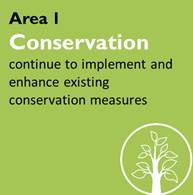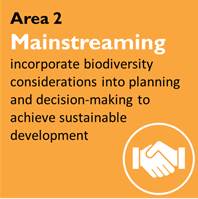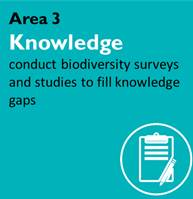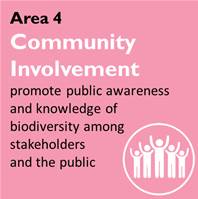Implementation
Since the launch of BSAP in December 2016, all relevant Government bureaux and departments and other external stakeholders have been implementing specific actions in the BSAP that are under their purviews. The progress of implementation will be reported to the Advisory Council on the Environment (ACE) on an annual basis.
This link will open in a new windowProgress report discussed in ACE meeting – February 2018
This link will open in a new windowProgress report discussed in ACE meeting – March 2019
This link will open in a new windowProgress report discussed in ACE meeting – May 2020
This link will open in a new windowProgress report discussed in ACE meeting – May 2021
This link will open in a new windowProgress report discussed in ACE meeting – September 2023
![]()
Area 1 - Enchancing conservation measures

- This link will open in a new windowBlack-faced Spoonbill Species Action Plan 2024 - 2028 published (December 2023)
- This link will open in a new windowGreen Turtle Species Action Plan 2023 - 2027 published (August 2023)
- This link will open in a new windowIncense Tree Species Action Plan 2023 - 2027 published (June 2023)
- This link will open in a new windowDesignation of South Lantau Marine Park (June 2022)
- This link will open in a new windowRomer's Tree Frog Species Action Plan 2022 - 2027 published (March 2022)
- This link will open in a new windowHong Kong Wetland Park Habitat Management Plan updated (May 2021)
- This link will open in a new windowExpansion of the restricted area at Sham Wan, Lamma Island, and extension of the restricted period for strengthening the protection of green turtles (April 2021)
- This link will open in a new windowFirst Stage of the Development of the Long Valley Nature Park (2020 – 2024)
- This link will open in a new windowCoral Restoration Study in Hoi Ha Wan Marine Park – 3D-printed Reef Tiles (December 2020)
- This link will open in a new windowImplementation of New Fisheries Management Strategy in Marine Parks (April 2020)
- This link will open in a new windowDesignation of Southwest Lantau Marine Park (April 2020)
- This link will open in a new windowDevelopment of a Risk Assessment Protocol for Identification of Invasive Alien Species (March 2020)
- This link will open in a new windowChinese Pangolin Species Action Plan 2019 - 2024 published (December 2019)
- This link will open in a new windowHard coral restoration at Hoi Ha Wan Marine Park (January 2019)
- Establishment of This link will open in a new windowCountryside Conservation Office (July 2018), This link will open in a new windowAdvisory Committee on Countryside Conservation (July 2019) and This link will open in a new windowCountryside Conservation Funding Scheme (October 2019)
- This link will open in a new windowGuidelines for Design of Terrestrial Wildlife Crossing Systems updated (March 2019)
- This link will open in a new windowThe Protection of Endangered Species of Animals and Plants (Amendment) Ordinance 2018 with three-step plan to phase out local ivory trade (May 2018)
- This link will open in a new windowIncense Tree Species Action Plan published (May 2018)
- This link will open in a new windowGuidelines for formulation of Species Action Plans published (March 2018)
- This link will open in a new windowDrainage Services Department carried out trial eco-enhancements at Lower Lam Tsuen River (2017)
- This link will open in a new windowLong-term conservation of Sha Lo Tung through non-in-situ land exchange (June 2017)
- This link will open in a new windowDesignation of The Brothers Marine Park (December 2016)
![]()
Area 2 - Mainstreaming biodiversity

- This link will open in a new windowStandard Specification of Nursery Plant Materials for Guangdong Hong Kong and Macau (May 2021)
- This link will open in a new windowRevitalisation works of Tsui Ping River by Drainage Services Department (2020 – 2024)
- This link will open in a new windowHong Kong 2030+: Towards a Planning Vision and Strategy Transcending 2030” (October 2021)
- This link will open in a new window“2020 Sustainable Slope Excellence Award – Natural Terrain Catchment Category” organised by Civil and Engineering and Development Department (January 2021)
- This link will open in a new windowChapter 10 (Conservation) of the Hong Kong Planning Standards and Guidelines amended to incorporate biodiversity considerations (March 2020)
- This link will open in a new window “Hong Kong 2020 International Urban Forestry Conference” organised by Development Bureau (January 2020)
- This link will open in a new windowAdoption of the first set of Specification of Competency Standards for the arboriculture and horticulture industry (November 2019) (Chinese Only)
- This link will open in a new windowUrban green projects by Government departments to promote biodiversity (On-going)
- This link will open in a new windowBEAM Plus New Buildings Version 2.0 launched by the Hong Kong Green Building Council, with new incentives to promote biodiversity in building projects (September 2019)
- This link will open in a new window"Street Tree Selection Guide" released by the Greening, Landscape, and Tree Management Section (GLTMS) (December 2018)
- This link will open in a new windowBiodiversity considerations integrated in the Sustainability Assessment system (December 2018)
- This link will open in a new windowPublic educational events co-organised by LCSD and AFCD to promote biodiversity (December 2018)
- Supporting Education Bureau (EDB) to demonstrate role of biodiversity in Smart City Programme together with Drainage Services Department (DSD) and Construction Industry Council (CIC) (April 2018)
- Invited lecture on biodiversity in Hong Kong Flower Show 2018 (March 2018)
- This link will open in a new windowAssessing local fisheries resources
Supporting Education Bureau (EDB) to demonstrate role of biodiversity in Smart City together with Drainage Services Department (DSD) and Construction Industry Council (CIC) (April 2018)
-
AFCD, DSD and CIC collaborated to deliver a training on “Smart City and Biodiversity”, in
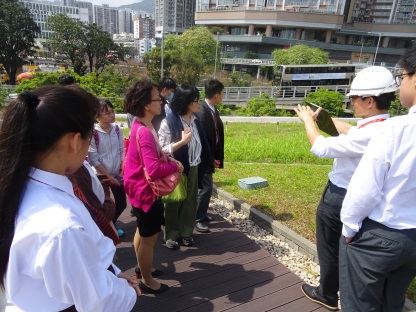 support of EDB’s Smart City Project Programme 2017/2018.
support of EDB’s Smart City Project Programme 2017/2018. -
Participating students and teachers visited Kowloon City Sewage Pumping Station No.1 and learnt how the greening and grey water recycling features of the Station supported biodiversity, and contributed to the sustainability of the infrastructure.
-
Participants also visited the Zero Carbon Building and learnt the importance and composition of Hong Kong’s first urban native woodland, as well as how other Smart Cities tackle the challenges of climate change.
Invited lecture on biodiversity in Hong Kong Flower Show 2018 (March 2018)
-
AFCD was invited by Leisure and Cultural Services Department to speak about “Making
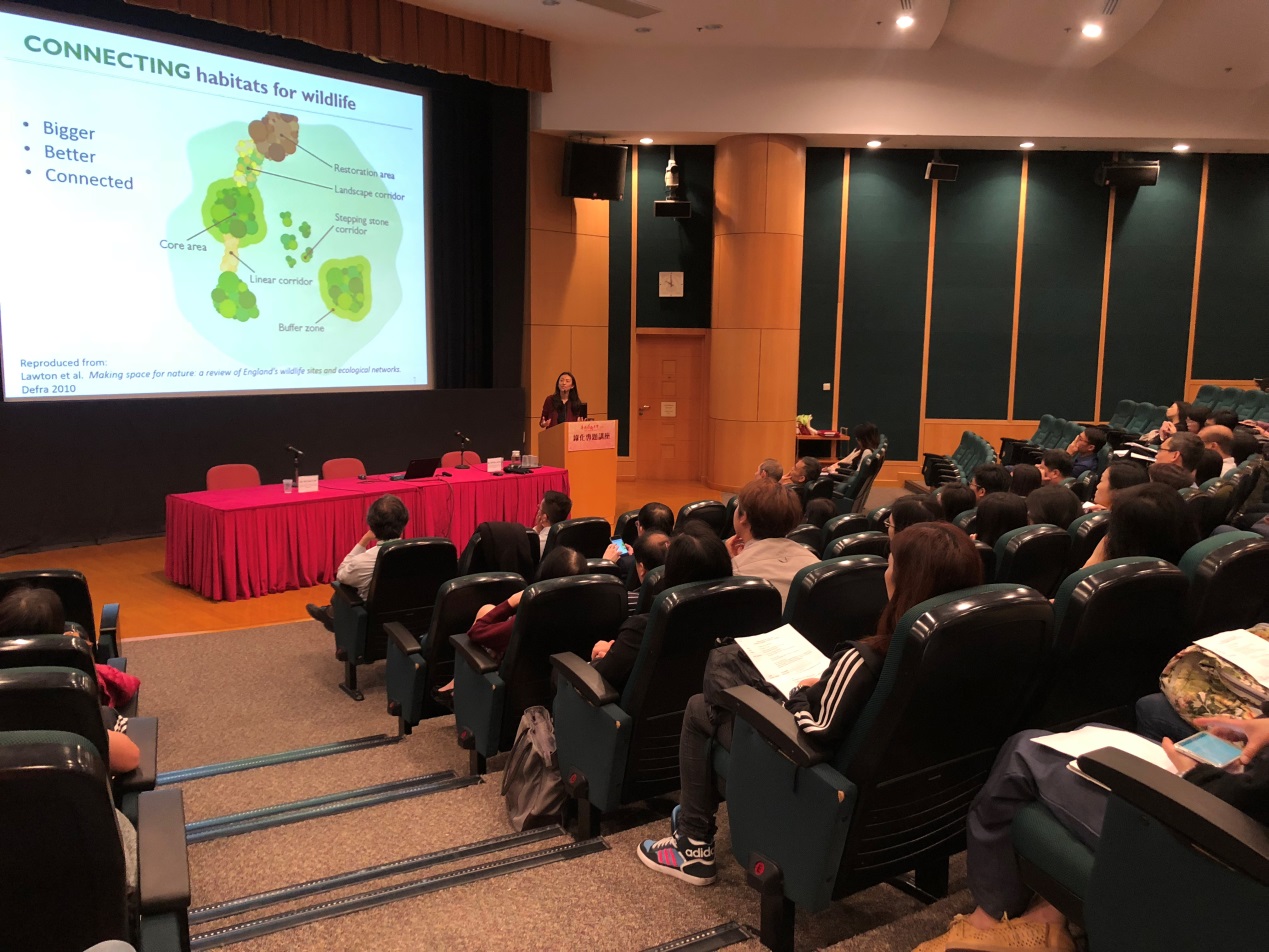 Our Gardens More Biodiversity-friendly” and “Native Forest Vegetation in Hong Kong” in the Seminar on Greening of this year’s Hong Kong Flower Show.
Our Gardens More Biodiversity-friendly” and “Native Forest Vegetation in Hong Kong” in the Seminar on Greening of this year’s Hong Kong Flower Show. - Topics covered include principles of enhancing urban biodiversity, ways of making habitats attractive to wildlife, examples of native plants useful to wildlife, and an overview of vegetation types and features of forests in Hong Kong.
![]()
Area 3 - Improving our knowledge

- This link will open in a new windowA Study on Ecosystem Services in Hong Kong (2022)
-
This link will open in a new windowLaunch of Biodiversity Information Hub (March 2022)
- This link will open in a new windowJuvenile Fish Survey at Marine Parks and Marine Reserve (September 2021)
- This link will open in a new windowChecklist of Biodiversity of Hong Kong updated (July 2019)
-
Management Agreement projects that promote traditional knowledge for conservation of biodiversity continue to be implemented
Compiling a List of Threatened Species for Hong Kong
-
The institutional framework for compiling the Hong Kong List of Threatened Species has
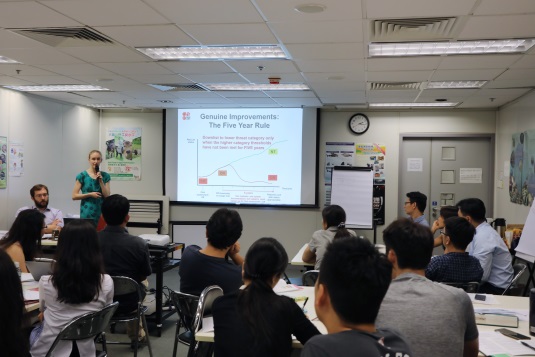 been formulated. Experts for different taxonomic groups, including AFCD officers and experts from academic institutes or other organisations, were also appointed as assessors and reviewers in May 2018.
been formulated. Experts for different taxonomic groups, including AFCD officers and experts from academic institutes or other organisations, were also appointed as assessors and reviewers in May 2018. -
AFCD has arranged training for the personnel involved in the assessment in late May to early June 2018.
- The different specialist groups have started conducting assessments or preparatory work for the assessments, and draft assessments of some groups are undergoing an independent review process.
Management Agreement (MA) projects that promote traditional knowledge for conservation of biodiversity continue to be implemented
-
Traditional freshwater wetland crops are being grown in This link will open in a new windowLong Valley and Ho Sheung Heung
 and This link will open in a new windowLai Chi Wo MA projects, and the traditional fishpond drain-down practice is being implemented in the MA projects This link will open in a new windowwithin and outside Ramsar Site, demonstrating the wise use of natural resources in contributing to the conservation of biodiversity. In addition, in 2021, a new MA project was launched in the country park enclaves at This link will open in a new windowMui Tsz Lam and Kop Tong, to conserve, revitalize and enhance the natural, cultural and landscape values in these old upland Hakka villages.
and This link will open in a new windowLai Chi Wo MA projects, and the traditional fishpond drain-down practice is being implemented in the MA projects This link will open in a new windowwithin and outside Ramsar Site, demonstrating the wise use of natural resources in contributing to the conservation of biodiversity. In addition, in 2021, a new MA project was launched in the country park enclaves at This link will open in a new windowMui Tsz Lam and Kop Tong, to conserve, revitalize and enhance the natural, cultural and landscape values in these old upland Hakka villages.
![]()
Area 4 - Promoting community involvement

- This link will open in a new windowBiodiversity Education Programmes (On-going)
- Survey on the Attitude and Level of Knowledge of the General Public and Stakeholder Groups Towards Biodiversity in Hong Kong This link will open in a new window(Full report)This link will open in a new window(Summary) (February 2023)
- Launch of “Hong Kong Marine Classroom” This link will open in a new windowfacebook page, This link will open in a new windowinteractive webpage and This link will open in a new windowHong Kong Marine Classroom 2019-2020 booklet (2019)
-
This link will open in a new windowHong Kong Biodiversity Festival
-
Learning and teaching packages for kindergarten - "This link will open in a new windowCountryside Adventure" (Lions Nature Education Centre), "This link will open in a new windowWetland Footprints" (Hong Kong Wetland Park) (July 2018)
-
This link will open in a new windowSustainable Consumption of Biological Resources







